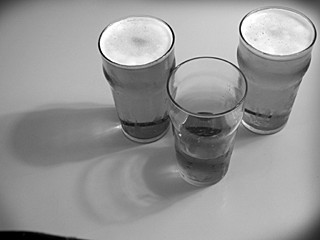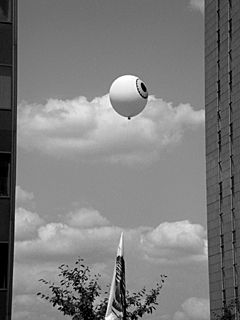| | 
- 23 July 2001
- Why I Like Whales
- Why am in London for the fifty-third annual meeting of the International Whaling Commission? I’m certainly not here for the whales; they’re big enough to take care of themselves. Although I like whales—especially with wasabe and soy sauce—they’re no reason to come to a miserably hot and filthy city like London.
There’s only one reason I regularly attend International Whaling Commission meetings: Robin des Bois. Robin des Bois is some sort of French environmental organization; I have no idea what the group does in theory. I know exactly what Robin des Bois does in practice, which is why I’m here. Robin des Bois always sends two representatives to the International Whaling Commission meeting: a beautiful French woman, and another beautiful woman who’s half French and half something else. Some years she’s half-Scottish; this year she’s half-American. Who cares? Every day at precisely 16:00, the beautiful women from Robin des Bois bring three pints of beer to my hotel room. They chat amiably for a few minutes, then leave me alone with my beer. Craig told me that Robin des Bois means “Robin of the Woods,” or “Robin Hood.” Perhaps they took the beer from the rich in order to give it to the poor, which, for purposes of a self-serving argument, is me. Again, who cares? When beautiful women bring me free beer, I’m not going to ask any questions. 

- 24 July 2001
- Inscrutable Protest
- This year’s International Whaling Commission meeting is as tedious as all the other ones I’ve attended. The whalers and anti-whalers have lost whatever passions they might once have once brought to the forum. Everyone seems tired, like athletes who are still playing a game at midnight that was scheduled to conclude well before dinner.
Some alleged conservation group has mounted a breathtakingly lame “protest” outside the Novotel Hotel, colloquially known here as “the msot mediocre hotel in the world.” Some of the protesters are dressed up like members of the San Francisco musical ensemble, The Residents, with their heads covered in a plastic sphere painted to resemble an eyeball. They’re also flying balloons painted to resemble eyeballs from a banner that warns the whalers that the world is watching them. I think the theory is that the Japanese whalers will blush seven shades of crimson once they realize everyone knows they’re killing whales. That might be a good strategy for eradicating nose-picking on Tokyo subways, but the Japanese hunt whales with a genuine eagerness that the so-called environmentalists can’t seem to match. Take Masayuki Komatsu, for example. The deputy commissioner of the Japanese delegation is perhaps the only other artist at this wretched meeting; he’s an extraordinary poet. He described minke whales (Balaenoptera acutorostrata) as the “cockroaches” of the ocean, “because there are too many, and speed of the whale, swimming so quick.” That’s brilliant! If I was one of the people who couldn’t come up with anything more creative than some recycled eyeballs, I’d blush eight shades of cerise. I eavesdropped on an interview the BBC was taping with Komatsu in the hopes that he’d come up with something as lovely as his cockroaches remark. I was not disappointed. “And finally, Mr. Komatsu,” the reporter asked, “what do you make of the protest outside?” Komatsu turned away from the camera and asked an aide a question in Japanese. The subordinate then leaned over and whispered something in Komatsu’s ear. “Inscrutable!” Komatsu replied with a broad smile. “Most inscrutable!” 
- 25 July 2001
- Entertaining Economic News
- This morning, I heard a radio announcer report, “The economic slowdown is gaining momentum.”
That statement is probably the first bit of economic news I’ve ever heard that contained a scintilla of entertainment value. 
- 26 July 2001
- My Extensive Art Collection
- Wilbur wrote to tell me of his surprise in learning that I’d never purchased a piece of artwork until last month. (For the record, I have acquired a few works in the past, but in exchange for nonmonetary currencies.) Since I’m feeling rather lazy at the moment—now there’s a plot twist!—I’ll let a couple paragraphs of my reply serve as today’s notebook entry.
You’re incorrect when you say that I don’t collect art. I do, just not in the traditional way. It’s true that I don’t have a locked room in which I keep signed work away from light, heat, acidic paper, air pollution, et cetera. Except for the odd toy, I derive little pleasure from objects.About the only art I like is conceptual, in the broadest sense. I’m not very attracted to art that relies on retinal, tactile, or other physical properties. As a result, I can “collect” a piece just by looking at it; I own everything in my head. My collection would fill many museums, and fits between my ears with room to spare for Rainer Ale.

- 27 July 2001
- Who Killed All the Fish?
- What do all endangered species have in common? They’re tasty!
That’s what I was thinking last night as I gobbled wild salmon at a reception; that’s what I’m thinking this morning as I enjoy a bagel-like British bakery product piled with lox. An article in this morning’s Independent reinforced my belief that we humans are rapacious predators. A team of experts from Australian and American marine laboratories have published the results of an exhaustive study showing that we’ve been plundering marine life at an astonishing rate ever since our earliest ancestors figured out how to kill fishy things. (Rhetorical question: if you can’t believe a team of fisheries experts, who can you believe?) In addition to the experts’ report, I’ve also heard amazing anecdotes from my late friend Greg, a commercial fisherman. Greg once told me about motoring through the Sea of Rum on a three-person fishing boat bristling with electronics. (Even if I live another century, I’ll never tire of the cliché, “bristling with electronics.”) Greg was able to fish in the Sea of Rum because the electronics did all the fishy thinking, thus relieving him of the burden of superfluous thought. The ship’s sonar watched the schools of fish swimming below, and when the virtual eye spotted a profitable catch, the machine would beep to let the ship’s crew know it was time to get to work. Of course, these electronic servants were small beer compared to the massive factory fleets with hundred-kilometer driftnets that killed almost anything in their path much bigger than plankton. But everyone knows that. The big news in today’s report is that we’ve been so good at being so destructive for so long. The researchers found that even the earliest hunting and fishing from shore was remarkably effective in changing the oceans’ ecosystems. The colonial expansion half a millennium ago led to increasingly effective ways of catching massive amounts of fish, culminating in today’s increasingly rare salmon. All this leads to an obvious conclusion: who cares? 
- 28 July 2001
- Jim Alley
- I just learned that Jim Alley died on 22 June. His wife Majie wrote:
He was treated for kidney cancer in 1999 and for prostate cancer in 2000 and was cured of both, but he died within a matter of weeks after being diagnosed with pancreatic cancer which had metastasized to his liver by the time it was discovered. Jim was fortunate that he had very little pain, as pancreatic can be one of the most painful cancers. He died peacefully at home. Jim was 58 when he died. Our fortieth wedding anniversary would have been this August 5.
- Jim was one of five people who made me who I am. In addition to my parents, there was Jim, Lary Lien, and Wayne Brill. Jim and Lary sold me—by example, without even trying—on how wonderful it was to be an artist: rewarding work, parties, and of course, the smart, beautiful artists of the opposite sex. (Wayne showed me the beauty of craft and technique.) If it wasn’t for them, I probably would not have become an artist. I can’t imagine anything better than the life of a slothful and self-indulgent artist. Without Jim and Lary, I’d probably be a reasonably well-to-do commercial photographer in Chicago, or perhaps even worse.
I started a message to Jim last February: “I heard David Johansen and the Harry Smiths singing the James Alley Blues.” That was as far as I got; I probably would have added a few paragraphs and eventually sent it in a few months. I see we sent each other brief notes every two or three years. Idiot that I am, I thought we had forever. He didn’t, and I don’t either. Time to get back to work. Thanks for everything, Jim. 
- 29 July 2001
- A Foray Into Minimalism
- When I have a reunion with someone I haven’t seen in a while, I generally ask about and report on four things: health, love, art, and business. And so it was that I found myself describing my recent art work to Buzz.
“I’ve taken minimalism to perhaps the ultimate extreme,” I began. “Sounds logical,” Buzz replied. “Most of the stuff you’ve done in the last decade has been pretty boring, so I guess it was just a matter of time before you moved on from extreme boredom to stultification.” I smiled. “I may regret asking this,” Buzz continued, “but what kind of work is the ‘ultimate extreme’ of minimalism?” “Nothing,” I answered. “What do you mean, ‘nothing?’” he asked. “Just that,” I explained. “Zip. Nada. Nothing. I haven’t done anything of substance this millennium. Pretty damn minimal, eh?” “That’s admirably minimal, “Buzz agreed, “but I think you need to work harder if you’re really going to be an extremist. After all, billions of other people haven’t made any art this year, either. I think you should consider working backward and destroying your past work. I figure that by the time you’ve eliminated everything you ever created you’ll have reached your full potential as an artist.” “Thanks for the advice, Buzz,” I said. “I found it extremely useful. I think that’s what I needed to get going again.” I didn’t add the four reasons I liked his advice. First, I usually do the opposite of what I’m advised. Second, I’ve already done an erasure piece—who hasn’t? Third, I will gain a modicum of satisfaction from knowing my new work will annoy at least one person. And finally, I can’t imagine anything worse than realizing my full potential. What would I do the next morning? 
last weak | index | next weak
©2001 David Glenn Rinehart
| |

